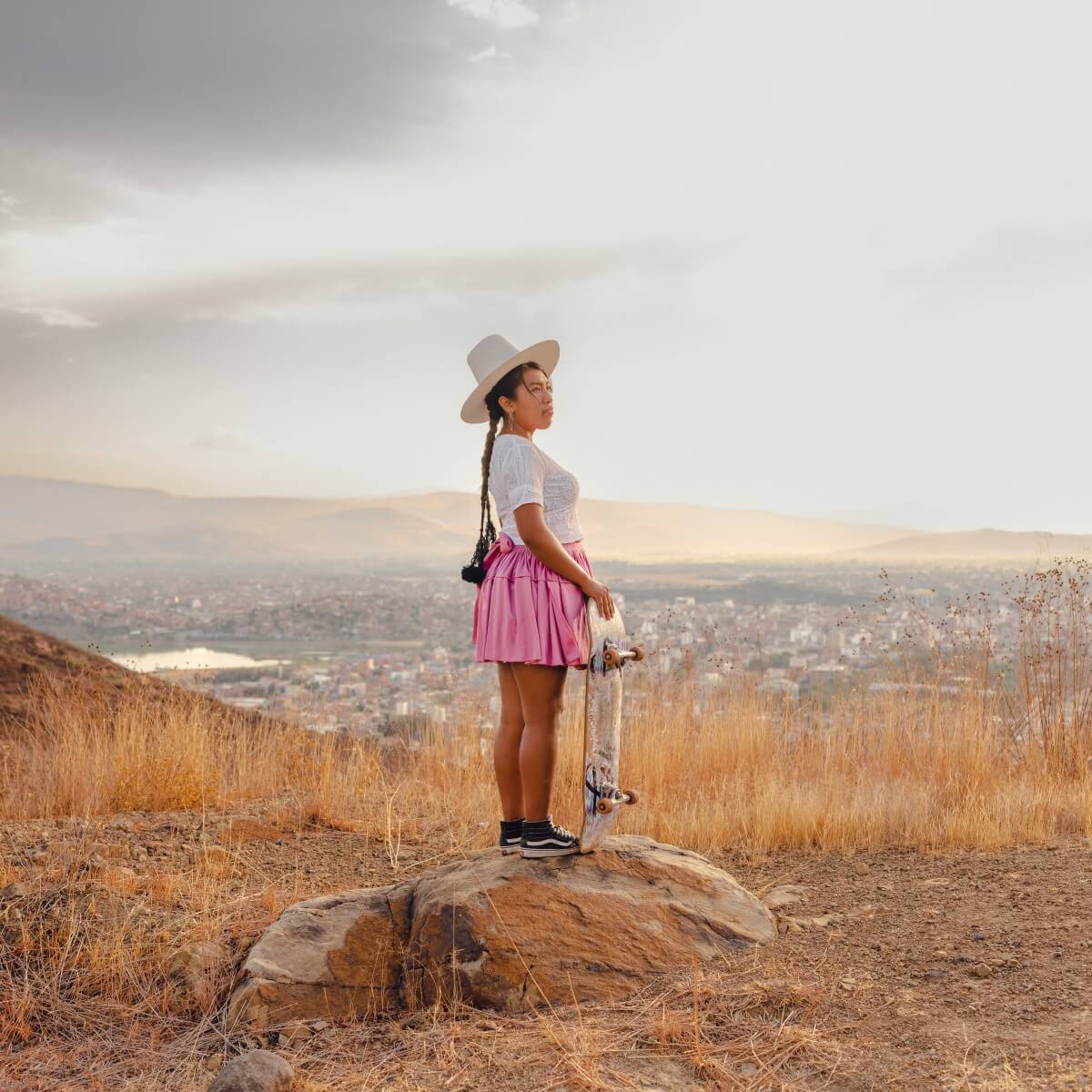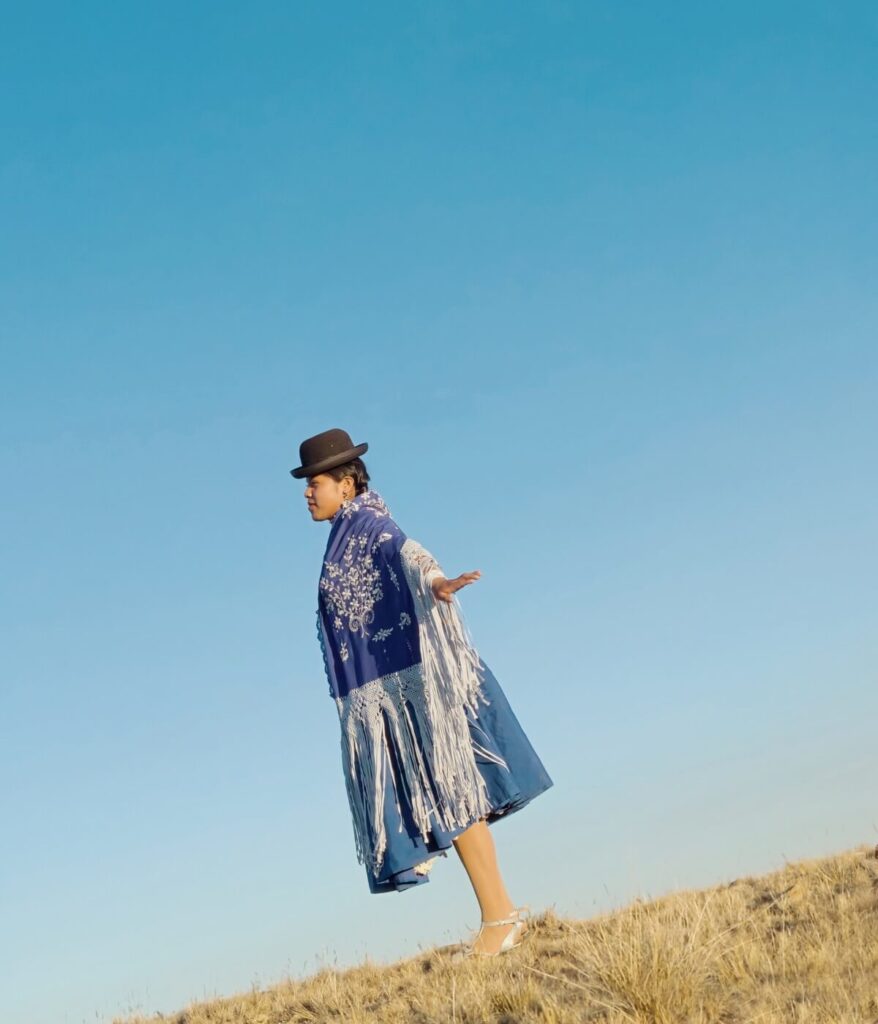ルイーザ・ドア|Luisa Dörr
The Flying Cholitas, Imilla

作品解説
《The Flying Cholitas》(2019)
アンデス山脈の標高4,000メートル、ボリビア第2の都市エル・アルト。ここでは、何層にも重なったスカートとボウラーハットを身につけた先住民の血を引く女性たち「チョリータ」が1960年代から市民権を求めて活動し、2006年には同市初の女性市長を誕生させるなど、政治・経済面で力を獲得してきた。かつての蔑称もいまでは誇りと力の象徴だ。彼女たちの最も華やかな自己表現の場は、日曜日のレスリングリング。伝統衣装をまとったチョリータたちが観客を沸かせる。華麗な技やアクロバティックな動きの裏にあるのは、世代を超えた闘争と変革の歴史だ。回転するスカートは祖母たちの糸車を想起させ、リングは抗議と祝祭の場となる。彼女たちはもはや声なき存在ではない。
《Imilla》(2021)
ボリビアの山岳地帯で代々受け継がれてきた「ポジェラ」と呼ばれるスカートは、オリジナリティの象徴であると同時に、長年にわたる差別の対象でもある。しかし今、この伝統衣装は若き女性スケーターたちによって、レジスタンスの象徴へと再定義されている。ポジェラは16世紀のスペイン植民地時代に始まるが、時を経て地域文化の一部として根付いた。「ポジェラには本物らしさとスティグマの両方がある」と語るのは、2019年に女性スケーター集団「イミージャスケート」を結成した26歳のダニ・サンティバニェスだ。現在9名が所属するこのグループは、スケートの時だけポジェラを身にまとい、ボードと身体を通じて女性のエンパワーメントや多様性の受容を訴える。
The Flying Cholitas(2019)
At an altitude of 4,000 meters in the Andes, in El Alto—Bolivia’s second-largest city—reside the “Cholitas,” Indigenous women known for their layered skirts and distinctive bowler hats. Since the 1960s, they have fought for civil rights, culminating in 2006 with the election of the city’s first female mayor, a milestone securing significant political and economic agency. What was once a derogatory term has been reclaimed as a powerful symbol of pride and empowerment.
Their most striking form of self-expression unfolds every Sunday in the wrestling ring, where Cholitas, clad in full traditional attire, captivate audiences with elegant technique and acrobatic prowess. Beneath the spectacle lies a profound history of intergenerational struggle and transformation. Their swirling skirts recall the spinning wheels of their grandmothers, while the wrestling ring serves as both a stage of protest and celebration. No longer voiceless, they command presence and agency.
Imilla(2021)
In Bolivia’s mountainous regions, the pollera—a traditional skirt passed down through generations—has long symbolized cultural identity while simultaneously marking its wearers for discrimination. Today, it is being reimagined as an emblem of resistance by a new generation of young women skaters.
Though the pollera originated during Spanish colonial rule in the 16th century, it has been woven indelibly into regional culture. “The pollera holds both authenticity and stigma,” explains 26-year-old Dani Santibañez, founder of the women’s skate collective ImillaSkate, established in 2019. Now comprising nine members, the group exclusively wears polleras while skating, using their boards and bodies to articulate female empowerment and advocate for the celebration of diversity.

Profile
ルイーザ・ドア|Luisa Dörr
ブラジル生まれ。南米を中心に、女性の置かれる環境とその複雑性、アイデンティティ、人間性を探求する。静謐なポートレートを通して、被写体の奥深い物語を紡ぎ出す。「National Geographic Magazine」「The New York Times」「The Washington Post」など、数多くの国際メディアで紹介されてきた。2015年にはLensCulture Emerging Talentに選出され、2018年には「TIME」誌のマルチメディア企画「FIRSTS」にてPOYi Documentary Project of the Year賞を受賞。2019年には、スペイン・バレンシアの火祭り文化を捉えた《Falleras》でWorld Press Photo賞のポートレート・ストーリー部門第3位に輝いた。
Born in Brazil, the artist investigates the complex realities faced by women across South America, exploring themes of identity and humanity. Through quiet, intimate portraits, she unveils the profound and often untold narratives of her subjects.
Her work has appeared in prestigious international publications such as National Geographic Magazine, The New York Times, and The Washington Post. In 2015, she was recognized as a LensCulture Emerging Talent, and in 2018, she received the POYi Documentary Project of the Year award for her contribution to TIME’s multimedia project FIRSTS. In 2019, her project Falleras, which documents the fire festival culture of Valencia, Spain, was awarded 3rd Prize in the Portrait Stories category of the World Press Photo Award.